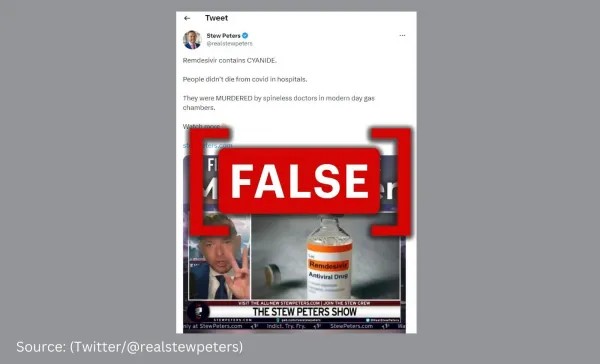By: Ankita Kulkarni
June 14 2023

Remdesivir contains nitrile, an organic compound commonly used in therapeutic drugs that is safe for consumption.
Context
A video shared on Twitter by Stew Peters, an individual known to spread conspiracy theories, claims that Remdesivir contains cyanide. Remdesivir is an antiviral medication that was approved to treat COVID-19 patients in hospitals in 2020, but its efficacy in treating COVID-19 is still being explored.
Peter’s post claims that Remdesivir is responsible for “killing patients hospitalized with COVID-19.” The caption reads, “Remdesivir contains CYANIDE. People didn’t die from covid in hospitals. They were MURDERED by spineless doctors in modern day gas chambers (sic).” The post has 354,900 views. However, this claim is false and not supported by scientific evidence.
In Fact
Remdesivir injection is sold under the brand name Veklury in U.S. and is developed by biopharmaceutical company Gilead Sciences. On looking through its contents, we found that the injection contains Remdesivir drug as an active ingredient and other inactive ingredients for pH adjustment. There is no mention of cyanide in the list.
The U.S. National Center for Biotechnology Information (NCBI) states that Remdesivir “is a carboxylic ester, a pyrrolotriazine, a nitrile, a phosphoramidate ester, a C-nucleoside and an aromatic amine.” And its IUPAC (International Union of Pure and Applied Chemistry) name includes “5-cyano” in it. The phrase “5-cyano” and “nitrile” could be the source of this misinformation.
NCBI describes nitrile as an “organic compounds containing the -CN radical. The concept is distinguished from CYANIDES, which denotes inorganic salts of HYDROGEN CYANIDE.” Subsequently, the presence of a cyano functional group in Remdesivir does not mean that it contains cyanide.
For instance, Cyanocobalamin is a form of vitamin B12 that is used to treat vitamin B12 deficiency, and this does not imply that B12 contains cyanide and is harmful to the human body.
To find out more about the application of nitrile in medicine, we found a 2021 research paper published on NCBI titled “Nitrile-containing pharmaceuticals: target, mechanism of action, and their SAR studies.” It notes that the nitrile functional group is widely found in both pharmaceutical agents and natural products. The FDA (U.S. Food and Drug Administration Authority) has approved more than 30 nitrile-containing pharmaceuticals which cater to a broad range of clinical conditions and clinical disorders, including heart failure, hypertension, chronic myeloid leukemia, breast cancer, and fungal infection. This proves that using nitrile in medicine is not unusual and is safe.
Furthermore, the claim that Remdesivir is killing more patients in hospitals is not scientifically backed. Recent studies have pointed out that Remdesivir has little or no effect on all‐cause mortality or in‐hospital mortality of individuals with moderate to severe COVID‐19.
Also, it is important to note that drug compositions are strictly regulated by agencies like FDA and the European Medicines Agency (EMA). NIH notes that “cyanide is one of the most rapidly lethal poisons known to man. Cyanide can lead to death in a few minutes to a few hours.” Its inclusion in an approved treatment such as Remdesivir would be illegal.
Remdesivir was approved by the FDA in 2020 based on clinical trials. Although the World Health Organization had issued a conditional recommendation against the use of Remdesivir in 2020, it was updated on April 22, 2022, noting that it can be used in mild or moderate COVID-19 patients who are at high risk of hospitalization. However, using it for patients with severe or critical COVID-19 is currently under review.
Logically Facts reached out to Professor Anurag Agrawal, former director of the Institute of Genomics and Integrative Biology, a national laboratory of CSIR, India. He told us, “(There is) no cyanide in Remdesivir. (It contains) Cyano-group, yes but that’s not the same as poisonous cyanide.”
The Verdict
Remdesivir contains nitrile, an organic compound that is widely used in medicine and drugs. It is not to be mistaken with cyanide. There is no scientific evidence that the administration of Remdesivir is killing patients in hospitals. Therefore, we have marked the claim as false.
The COVID-19 pandemic has given rise to a lot of potentially dangerous misinformation. For reliable advice on COVID-19, including symptoms, prevention, and available treatment, please refer to the World Health Organization or your national healthcare authority.